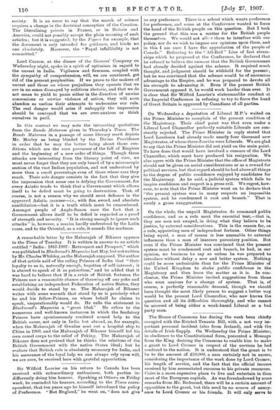On the whole, the unpaid Magistrates do command publie confidence,
and as a rule meet the essential test,—tbat is they are men not swayed, in doing what they believe to be justice, by external considerations. This is the reason for, as a rule, appointing men of independent fortune. Other thine being equal, a man of means is less amenable to external influences than a man of insecure pecuniary position. But even if the Prime Minister was convinced that the present system must be condemned root and branch, be had, in our opinion, no business to say so unless he was prepared tq introduce without delay a new and better system. Nothing could be more undesirable than for the Prime Minister of the United Kingdom to shake public confidence in the Magistracy and then leave the matter as it is. In con- clusion, the Prime Minister invited suggestions from tliose who were anxious for a, change of system. That is, of course, a perfectly reasonable demand, though we should have thought the most likely person to suggest a better way would be the present Lord Chancellor, who new knows the question and all its difficulties thoroughly, and who cannot be accused of being either a weak-kneed Liberal or a bad party man.






































 Previous page
Previous page